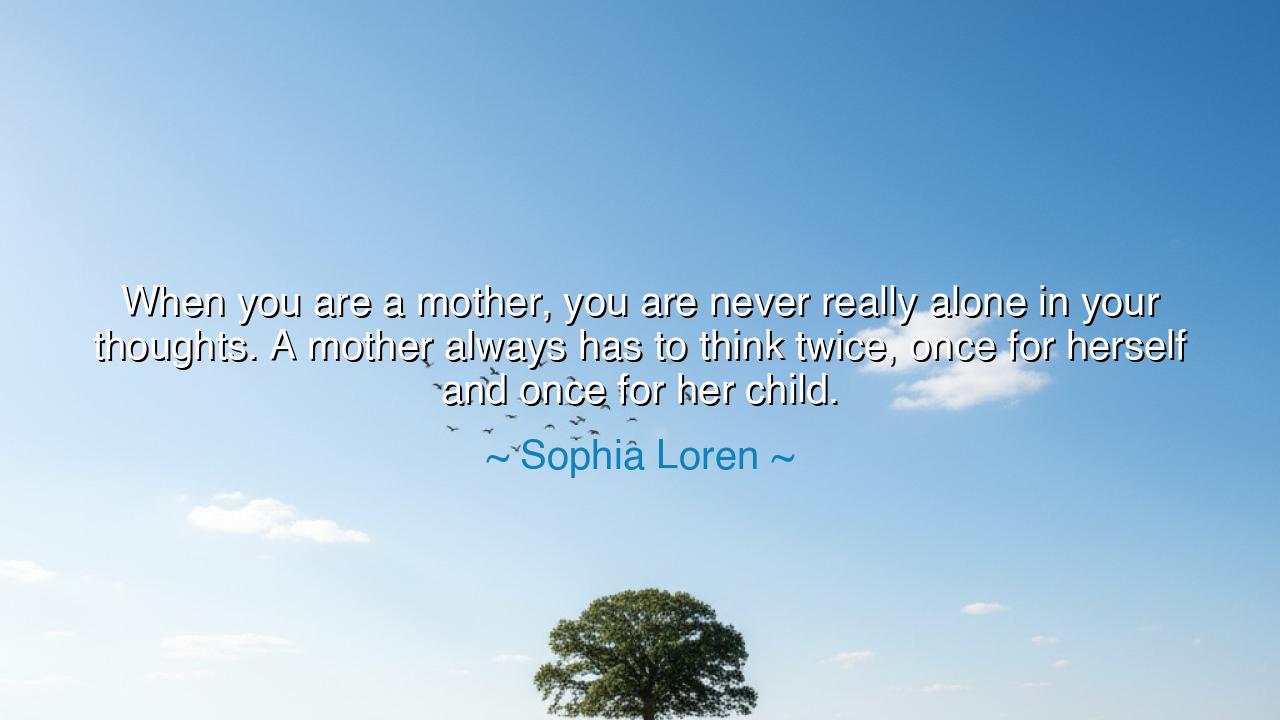
When you are a mother, you are never really alone in your
When you are a mother, you are never really alone in your thoughts. A mother always has to think twice, once for herself and once for her child.






"When you are a mother, you are never really alone in your thoughts. A mother always has to think twice, once for herself and once for her child." These words by Sophia Loren capture the eternal essence of motherhood—a bond so profound that it transcends the self and creates an eternal connection to another life. To be a mother is to live not only for oneself but to continually be aware of another’s needs, desires, and future. A mother’s thoughts are not her own but shared with the life she has nurtured. Loren’s insight speaks to the constant selflessness inherent in the role of a mother, where every decision, every thought, is filtered through the lens of what is best for her child.
In the ancient world, the concept of motherhood was revered, yet it was also deeply understood that it demanded sacrifice. In Homer’s Odyssey, Penelope, the wife of Odysseus, was a shining example of maternal devotion. Though she was physically separated from her husband for many years, her thoughts were always with her son, Telemachus, and she made every decision with his future in mind. Her unwavering focus on her child’s well-being, even in the absence of Odysseus, reflects Loren’s idea that a mother’s mind is never truly her own—it is always occupied with the needs of the child. Her love for her son was not passive but an active, daily choice to think not just for herself, but for the one who depended on her.
Similarly, consider the Roman matron Cornelia, mother of the Gracchi brothers, Tiberius and Gaius, who were known for their political reforms and commitment to the welfare of the Roman people. Cornelia was often celebrated for her role in shaping the moral and intellectual development of her children. Her ability to think of her own self in the context of their futures, her constant awareness of their potential as leaders of the Roman state, demonstrates the selfless nature of a mother’s thoughts. Cornelia did not simply live for herself but for the legacy and well-being of her children. She embodies the very essence of Loren’s statement: a mother is always thinking twice—once for herself and once for the future of her child.
This dual focus of thought, as Loren so poignantly describes, is not a simple reflection but a mental burden. A mother’s responsibilities extend far beyond the nurturing of her child’s body; they encompass the shaping of a future, a soul, and a sense of identity. In modern times, we see this in the lives of women like Malala Yousafzai, who, though a global advocate for education and women’s rights, constantly balanced her own desires with the deep love and concern for her family. Her journey, though marked by her own resilience and voice, has always been deeply intertwined with her family’s welfare, particularly her father’s encouragement and the desire to protect her family in a world filled with danger. The sacrifice of thinking twice—for both her mission and her loved ones—has shaped her path.
The great lesson here is one of selflessness and prioritization. To be a mother is to live in a state of constant giving, where one’s thoughts are divided, not by choice but by necessity. Every decision made for oneself is accompanied by a simultaneous consideration for the well-being and future of the child. Loren’s words teach us that true love is not just a feeling but a sacred responsibility, an act of thoughtful reflection. It is the work of a mother to constantly place her child’s needs at the forefront of her mind, a task that can often be both exhausting and deeply fulfilling.
In our own lives, whether we are mothers or not, there is a profound lesson to be learned from this concept of dual reflection. We must learn to balance our individual desires with our responsibility to others—be it to our children, our families, or our communities. The capacity to think not only for ourselves but for the well-being of others is the hallmark of a truly compassionate and wise person. Just as a mother’s love is woven into her every action, so too can we weave a life of thoughtful decisions, always considering the impact of our choices on those who come after us.
Thus, let us take from Loren’s wisdom the understanding that love is not merely a fleeting emotion, but a deep, ongoing commitment to both self and others. Let us embrace the mental labor of thinking not just for ourselves, but for those who depend on us, for in doing so, we forge deeper connections and meaningful lives. Whether we are parents or caregivers, mentors or friends, the ability to think twice—once for ourselves and once for others—is the very foundation of selfless love and enduring strength.






AAdministratorAdministrator
Welcome, honored guests. Please leave a comment, we will respond soon